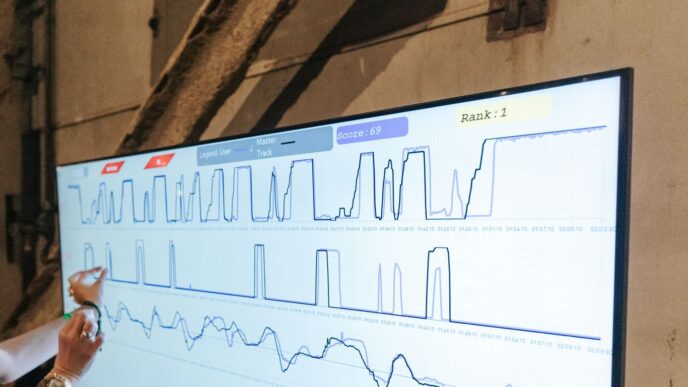So, Health IQ is in some serious trouble. You might have heard about the layoffs, but there’s a lot more going on behind the scenes. It looks like the company is facing a mountain of debt, lawsuits from people they owe money to, and even some claims from former employees about how they were treated. Plus, there’s a related company that got in hot water with the FTC. Let’s break down what’s happening with the health iq lawsuit and all the related issues.
Key Takeaways
- Health IQ is accused of violating the WARN Act by not giving employees enough notice before laying off hundreds of people. Some say the company knew these layoffs were coming.
- The company owes a lot of money to vendors, with lawsuits claiming millions in unpaid bills. This financial strain is a big part of the current problems.
- Health IQ has filed for bankruptcy, listing massive debts and very few assets. This means many creditors and investors might not get their money back.
- Even as the company struggled financially, top executives reportedly received significant payouts and salaries, which has caused some controversy.
- A related company, Assurance IQ, faced a large judgment from the FTC for deceptive marketing practices, particularly concerning health insurance sales.
Health IQ Lawsuit Allegations Surface
It seems like Health IQ is facing some pretty serious accusations, and they’re not just about money troubles. Several lawsuits have popped up, painting a picture of a company that might have really dropped the ball when it came to its employees.
WARN Act Violations in Mass Layoffs
Health IQ is being accused of not playing by the rules when it let a huge chunk of its workforce go. We’re talking about a couple of class-action lawsuits that claim the company completely ignored the federal Worker Adjustment and Retraining (WARN) Act. This law basically says companies have to give workers at least 60 days’ notice before a mass layoff. Apparently, Health IQ didn’t give its employees any notice at all, which is a big deal. The whole point of the WARN Act is to give people time to figure out their next steps, like finding a new job or getting some training.
Failure to Provide Advance Written Notice
So, the lawsuits are pretty clear on this: Health IQ didn’t give its employees the required 60 days’ written notice before the mass terminations. Some filings suggest that the company might try to argue that the layoffs were due to
Financial Distress and Vendor Disputes
It seems like Health IQ ran into some serious money problems, and a lot of companies they worked with are saying they didn’t get paid. We’re talking about millions of dollars owed to vendors who helped Health IQ find customers, especially during busy times like the Medicare Advantage open enrollment period. One vendor, WeCall, claims they are owed $2 million and their CEO feels like they were taken advantage of, saying, "They played the legal system to their benefit. We got taken advantage of. There’s no justice, evil won." Health IQ hasn’t really argued with this $2 million claim in the bankruptcy filings, which is pretty telling.
Millions Owed to Vendors
Health IQ relied on a bunch of outside companies, or vendors, to help them connect with potential customers, mostly seniors looking for Medicare Advantage plans. When the company started to struggle, these vendor payments dried up. Forbes previously reported that over a dozen lawsuits were filed, with claims adding up to more than $17 million in unpaid invoices. It’s alleged that even when the company knew it couldn’t pay, employees were pushed to keep getting leads from these vendors. Health IQ’s legal team has pushed back on these claims, but they also admitted in court filings that the company’s "current financial condition and lack of resources" made it hard to even respond to requests for information.
Breach of Contract Lawsuits
Because of these unpaid bills, Health IQ is facing a significant number of lawsuits from vendors claiming breach of contract. In fact, in a filing related to their bankruptcy, Health IQ listed seventeen such lawsuits as still pending. It’s pretty common for these kinds of disputes to get caught up in bankruptcy proceedings. Experts suggest that a bankruptcy judge will likely decide the fate of these lawsuits, as letting them continue separately could slow down the whole bankruptcy process.
Impact of Bankruptcy on Legal Claims
When a company files for bankruptcy, it puts a hold on most lawsuits against it. This means that the vendors who are suing Health IQ for unpaid services might have to wait a long time to see if they get any money back, and their chances might be slim. The bankruptcy process is designed to sort out who gets paid based on priority, and often, vendors who aren’t secured creditors can end up at the back of the line. It’s a tough situation for businesses that provided services expecting to be paid, only to find themselves in a lengthy legal battle with little hope of full recovery.
Bankruptcy Proceedings and Creditor Claims
Significant Liabilities and Limited Assets
Health IQ’s financial situation has taken a serious turn, with the company filing for bankruptcy. The filings reveal a staggering amount of debt, with secured claims totaling $67.5 million and unsecured claims reaching $189.2 million. This paints a grim picture, especially when considering the company’s assets. It appears that Health IQ’s ability to repay its debts is severely limited, leaving many creditors in a precarious position. The company’s original business model, focused on selling Medicare Advantage plans and earning commissions, seems to have faltered, leading to this financial collapse.
Secured and Unsecured Creditor Positions
The bankruptcy proceedings highlight a clear hierarchy of who gets paid first. Secured creditors, those who have collateral backing their loans, are at the front of the line. However, even for these creditors, the outlook is bleak. For instance, DASIR LLC is owed $6.5 million, but the value of its collateral is listed as "undetermined." Similarly, TriplePoint Venture Growth is owed $50 million, yet its collateral is valued at $0. This situation is mirrored by Quote Velocity and Innovative Employee Solutions, who are owed millions and have even secured writs of attachment, but their collateral is also listed as having no value. This suggests that even the priority secured lenders might not recover their investments.
Unsecured creditors, who do not have collateral, face an even tougher challenge. With limited assets available after secured debts are addressed, the chances of these creditors recovering their funds are slim to none. The sheer volume of claims, both secured and unsecured, far outweighs the company’s apparent asset base.
Sale of Intellectual Property
In an effort to generate some funds, Health IQ has sold the intellectual property associated with its "precision Medicare" software. This AI-powered tool was designed to help seniors find suitable Medicare Advantage plans by analyzing their health data. Silicon Valley Bank, a lender to the company, reportedly received $4.5 million from this sale. Health IQ has stated that this transaction did not involve the transfer of any patient data. However, the amount received from this sale is a fraction of the company’s overall liabilities, underscoring the depth of its financial troubles.
The bankruptcy process often involves complex negotiations and legal battles between creditors and the debtor. The outcome for each creditor depends heavily on the value of the company’s assets and the priority of their claims. In cases like Health IQ’s, where liabilities far exceed assets, many creditors may receive little to no recovery.
Executive Compensation Amidst Financial Woes
Even as Health IQ faced mounting financial troubles and mass layoffs, questions have arisen regarding the compensation received by its top executives. The company’s financial filings reveal significant payouts to co-founders and executives, even as liabilities grew and assets dwindled.
Payouts to Co-Founders
Shortly after the company initiated widespread layoffs in December 2022, co-founders Munjal Shah and Gaurav Suri reportedly received substantial payouts. These included payments described as "vacation accrual," with both individuals receiving tens of thousands of dollars. Despite stepping back from day-to-day operations and eventually resigning from his CEO role, Munjal Shah continued to receive payments from the company, totaling over $170,000 according to an analysis of court documents. These payments were made while Shah was reportedly working on a new venture.
CEO Salary and Retention Bonuses
Gaurav Suri, who took over as CEO in February, received a considerable sum in salary, expense reimbursements, and vacation accrual. This compensation package included a notable "retention bonus" of over $100,000. According to Suri, these bonuses were distributed to all employees based on a consistent formula and were approved at a time when the company still anticipated a potential reorganization.
Continued Compensation During Financial Decline
While the company was shedding employees and facing a severe financial downturn, executive compensation continued. Munjal Shah, for instance, drew a salary as a "special adviser to the CEO" even as he was reportedly dedicating time to his new startup. This situation raises concerns about the allocation of company funds during a period of significant financial distress and impending bankruptcy.
The contrast between the executive payouts and the company’s overall financial state, including its inability to pay vendors and massive liabilities, has drawn scrutiny from investors and former employees alike. It highlights a difficult period where the company’s leadership received substantial compensation while the business struggled to survive.
Regulatory Actions Against Related Entities
It’s not just Health IQ itself facing scrutiny. Related companies have also run into trouble with regulators, particularly concerning how they marketed health plans and collected consumer information. The Federal Trade Commission (FTC) has been quite active here.
FTC Judgment Against Assurance IQ
Assurance IQ, a company linked to Health IQ, ended up with a hefty $100 million judgment against it from the FTC. This was due to violations of the Telemarketing Sales Rule (TSR). The FTC found that Assurance IQ made a lot of misleading claims about health plans. They were told they couldn’t misrepresent things like:
- Coverage limits and benefits.
- The actual costs for consumers to buy or cancel plans.
- Whether a plan was included at no extra cost.
- If a plan was compliant with the Affordable Care Act (ACA) or offered comprehensive coverage.
- Whether plans provided access to provider networks that would lower medical bills.
The company was also barred from billing customers before getting their clear consent. This action highlights how important it is for companies to be upfront about what they’re selling, especially in the health insurance space.
Deceptive Marketing Practices
Beyond Assurance IQ, other entities like MediaAlpha and its subsidiary QuoteLab have also faced FTC action for deceptive marketing. These companies collected consumer information through websites that implied they were government-affiliated, using domain names like "ObamacarePlans.com." They promised low-cost, comprehensive health insurance that met ACA standards, but often, the plans offered by their partners didn’t live up to these promises. The FTC alleged that they even used actors and scripted segments to promote a fake "Health Insurance Give Back Program," suggesting people could get coverage for as little as $1 a day.
Telemarketing and Misrepresentation Claims
Many consumers reported being bombarded with robocalls and telemarketing calls from these companies. These calls often made false claims about the health plans being sold. Even people on the national Do Not Call Registry weren’t spared. The FTC’s complaint against MediaAlpha pointed out violations of the FTC Act, the TSR, and the Impersonation Rule. As a result, MediaAlpha faced a $45 million judgment, intended to refund affected consumers. They were also prohibited from making similar deceptive claims in the future and had to turn over misleading web domains.
The core issue seems to be a pattern of misleading consumers about health plan benefits and costs, often using aggressive marketing tactics and implying government backing where none existed. This led to significant financial penalties and restrictions on future operations for the companies involved.
Employee Claims Beyond Layoffs
It wasn’t just the mass layoffs that caused trouble for Health IQ. It turns out, some former employees have brought forward other serious allegations. These go beyond just losing a job and touch on workplace conduct and potential discrimination.
Discrimination Allegations
Some former employees have filed claims alleging they faced discrimination during their time at Health IQ. While the specifics aren’t fully public, these kinds of claims often involve unfair treatment based on protected characteristics like age, race, or gender. It’s a tough situation for anyone who feels they were treated poorly.
Sexual Harassment and Retaliation Claims
Beyond discrimination, there are also claims of sexual harassment and retaliation. These are incredibly serious accusations that can create a toxic work environment. When employees report such issues, they should be protected from any form of retaliation. The fact that these claims have surfaced suggests a potential breakdown in company policy or enforcement.
EEOC Complaints
These issues have also led to complaints filed with the Equal Employment Opportunity Commission (EEOC). The EEOC is the federal agency responsible for enforcing laws that make it illegal to discriminate against or harass job applicants or employees. While the agency hasn’t commented on the specifics of the Health IQ complaints, their involvement indicates that formal investigations may have been initiated. It’s a reminder that workplace issues can have significant legal consequences, and companies need to take these matters seriously. For businesses looking to manage their HR processes effectively, tools like TeamWave can help centralize employee data and policies.
The legal troubles for Health IQ seem to extend beyond just financial and operational issues, with former employees raising concerns about the workplace environment itself. These allegations, if proven, paint a concerning picture of the company’s internal culture during its decline.
Wrapping Up the Health IQ Situation
So, it’s been a rough time for Health IQ, with a lot of legal trouble and a bankruptcy filing. It looks like many people, from former employees to vendors, are unlikely to get back what they’re owed. The company faced lawsuits over how it handled layoffs, with claims of not giving enough notice, and also had issues with vendors not getting paid. On top of that, there were FTC actions regarding misleading sales practices for health insurance plans. It really highlights how complicated things can get when businesses face financial difficulties and legal challenges, leaving many stakeholders in a tough spot.














